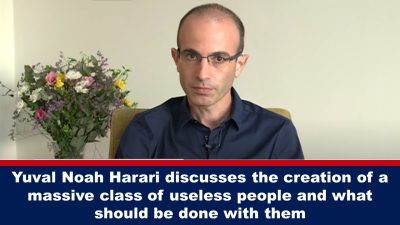Yuval Noah Harari Discusses the Creation of a Massive Class of “Useless People” and What Should be Done with Them

All Global Research articles can be read in 51 languages by activating the Translate Website button below the author’s name (only available in desktop version).
To receive Global Research’s Daily Newsletter (selected articles), click here.
Click the share button above to email/forward this article to your friends and colleagues. Follow us on Instagram and Twitter and subscribe to our Telegram Channel. Feel free to repost and share widely Global Research articles.
***
In 2015 and 2017, Israeli historian and philosopher Yuval Noah Harari discussed how a massive class of useless people was being created. The artificial intelligence revolution is beginning to create “the useless class,” he said.
When asked if his 2015 book provided any solutions, he responded:
“At present, the best guess we have is to keep them [the useless class] happy with drugs and computer games.”
In 2015, Yuval Noah Harari published two books: ‘Sapiens: A Brief History of Human Kind’ and ‘Homo Deus: A Brief History of Tomorrow’.
Dr. John Lennox, a renowned Oxford Mathematician and author of ‘2084: Artificial Intelligence and the Future of Humanity’, said Harari concerned him because of his widespread influence.
“He really is an influencer … What he actually has to say concerns me more because of its inaccuracy and his reading of history seems, to me, to be very strange,” Dr. Lennox said.
In Homo Deus, Dr. Lennox said, Harari says that there are two major agenda items for the 21st century.
“The first is to solve the technological problem of human death. He regards it as a technical problem and a technical problem with technical solutions. And then secondly, to enhance human happiness … [On] enhancing human happiness his target is, and this is more or less a quote, ‘is to turn Homo sapiens into Homo Deus’. In other words, turn humans into gods.”
Shortly after he released Homo Deus, Harari gave a speech based on his other book Sapiens at TED Talks. After his speech, Harai was asked to elaborate on a statement he made in his book Sapiens: “… new classes and new class struggles, just as the industrial revolution did.”
Harari answered:
“In the industrial revolution, we saw the creation of a new class of the urban proletariat. And much of the political and social history of the last 200 years involved what to do with this class and the new problems and opportunities.”
“Now, we see the creation of a new massive class of useless people,” he said.
“As computers become better and better in more and more fields, there is a distinct possibility that computers will out-perform us in most tasks and will make humans redundant. And then the big political and economic question of the 21st century will be, ‘What do we need humans for?’, or at least, ‘What do we need so many humans for?’”
Harari was then asked whether there were answers to those questions in his book. He responded:
“At present, the best guess we have is to keep them happy with drugs and computer games.”
He clarified he was not predicting the future but rather laying out possibilities.
“It’s not a prophecy; it’s seeing all kinds of possibilities before us,” he said.
As he saw it, there were only two possibilities; both would result in a massive number of useless people. He said:
“One possibility is this creation of a new massive class of useless people. Another possibility is the division of humankind into different biological castes, with the rich being upgraded into virtual gods, and the poor being degraded to this level of useless people.”
TED: Why humans run the world, 24 July 2015 (17 mins)
Just over two years later he joined Turkish broadcaster TRT’s The Newsmakers. TRT asks in the video caption: Thanks to new technology and artificial intelligence, will we achieve near immortality, or is the future for the human race a bleak one?
“The three biggest problems of humankind in the 21st century is the danger of nuclear war, it’s the danger of climate change and it’s the dangers inherent in disruptive technologies especially bioengineering and artificial intelligence,” Harari said.
“We are now gaining really divine powers of creation and destruction just as according to ancient religions God had the power to create animals and plants and humans according to his wishes. Now humankind in the 21st century with bioengineering and artificial intelligence gains this divine power to engineer and manufacture life.”
According to Harari, the main products of the 21st century economy will not be things like textiles, vehicles and weapons.
“The main products will be bodies and brains and minds. We are learning to design life … we are really upgrading ourselves into gods.”
It’s not absolutely certain technology, it’s not deterministic and we can still do something about it, he said.
“But, if we are not careful then, within the next century – let’s say within a hundred years – we may see humankind splitting into biological casts … With the rise of bioengineering, it might be possible to translate economic inequality into biological inequality and then … we will see humankind splitting into castes.”
He again referred to the creation of “the useless class.”
“The artificial intelligence revolution is beginning to create the useless class. As computers outperform humans in more and more tasks, they are likely to push them out of more and more jobs. And then the danger is that you will have millions of people even billions of people who don’t have any economic value and therefore they also don’t have any political power.”
The Newsmakers: Humanity on the brink? 5 October 2017 (13 mins)
*
Note to readers: Please click the share button above. Follow us on Instagram and Twitter and subscribe to our Telegram Channel. Feel free to repost and share widely Global Research articles.
Featured image is the The Expose

